Picking up trash puts Bayview man back on the streets, but this time with a noble mission and hope for the future.
Charles Franks, who dresses neatly in pressed jeans and button-down shirts, said he gets his dress code from his late grandpa, Elmo Gerald McNeal, who “always stayed suited and booted. He’d come home from work at Southern Pacific and change into a suit for dinner.”
Born in 1963 at San Francisco General Hospital, he gets his nickname, “The Black Cricket,” from his late grandma, Katherine Berniece McNeal. A super hero? “No, no, it’s ’cause I slept on all fours, knees and elbows, with my butt in the air, and she said I looked like a little black cricket,” he grins.
“Even today, anyone who comes up to me and says, ‘Hey, Cricket’, I know they know me from the hood.”
He was raised by his grandparents at their home on Mendell Street in the Bayview, and now spends his days as part of the Downtown Streets Team in San Francisco, working the very places he was homeless for a few years. The nonprofit program’s mission is to restore dignity and inspire hope, and provide a path away from homelessness through training, advocacy and housing assistance.
For now, Franks stays at a Navigation Center on South Van Ness Avenue, where he has a bed and meals. Starting at 5 a.m. with their “pickers,” carts and bags, Franks and his team have spent most of the pandemic on the dirty streets of their assigned district, the Mission, spearing trash.
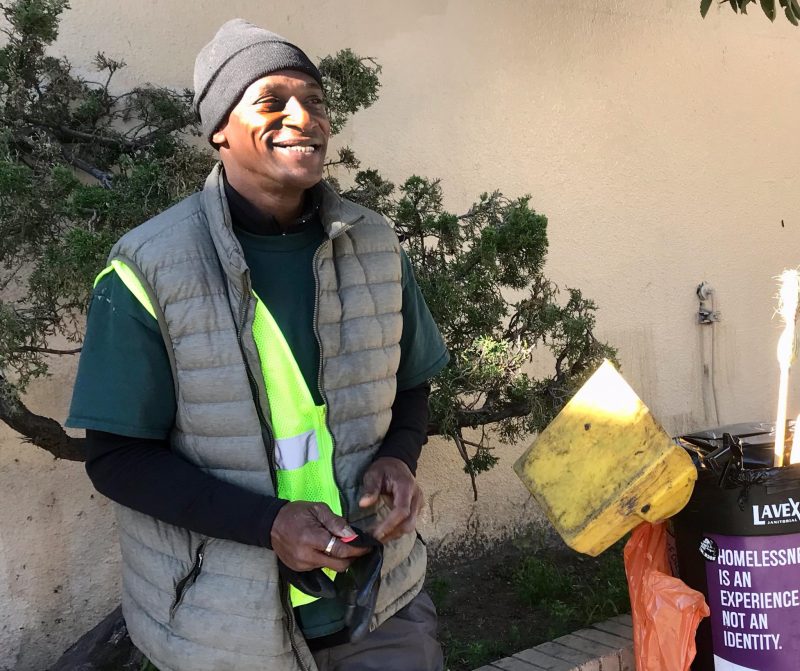
On a recent workday, he was neatly dressed in orange vest and silver track suit, his close-cropped hair setting off his high cheekbones (“from my mother”). Soft-spoken and gentlemanly, he opens doors for ladies. Still, keeping up with him requires a brisk pace. Moving fast and efficiently, he crisscrosses Valencia Street, his eyes scanning ahead for debris. “Some trash don’t want to be found,” he said. “You gotta know your spots!”
Trash near schools a pet peeve
For a year he was paid in gift cards; he first had to prove he could show up. In exchange for volunteering their time on beautification teams, team members receive case management, employment services, a basic-needs stipend, and a supportive community of peers.
This month, he started earning $18.50 an hour, along with a promotion to Team Lead of Street Team Enterprises, a division of DST, which operates in 16 communities across Northern and Central California. It is funded through grants, contributions and fees paid by various Community Benefit Districts, which are a funded through neighborhood property assessments.
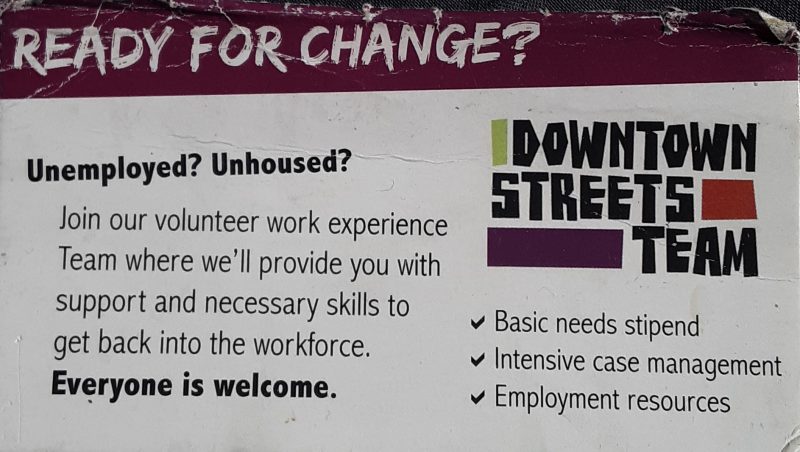
Near Valencia and McCoppin streets, boxed lunches and bottles of water are delivered to his team, and he pauses to drink. “My pet peeve is around schools. I don’t think it’s right that kids have to step around broken glass and all the crap. So I pay extra attention around the schools, me and my team.”
He greets a homeless Latina woman, “Hey, Mama Cuba,” sweeping around her cardboard mattress. “I don’t take the cardboard. You know how hard it is to find good, strong cardboard? I been on all-day hunts for good cardboard to sleep on when I was on the streets, come back to find it gone. Oh man, your heart just sinks.”
Ah, how well he knows San Francisco streets.
“I got my wild street ways from my mom. She was ‘bout 16 when she had me, met my dad at a nightclub in the Fillmore called the Off Plaza. I only saw her Saturdays ’cause she was off drugging and prostituting. She was gone in 1996, died of full-blown AIDS.”
A happy childhood
But between birth and “his wild street ways,” Franks recalled a great childhood.
“Bayview Hunters Point was an awesome place to grow up, with a rich history. Plus, I had all these brothers and sisters cause my grandma was a foster mother. She took in as many as the house could hold. In those days, they didn’t set limits.”
He speaks of those years with warmth and affection, adding details that remain fresh.
“We had enough money that my grandpa got a new Cadillac every other year from George Olson Cadillac on Van Ness Avenue. He took grandma out fancy dancing in that car; they tore the Fillmore up. I was a good kid, a track star, and I played left field for the Balboa High Buccaneers.“
Franks’ path veered toward his mother’s when he began cutting class and “got curious why my friends were having more than me.” He had a lot of older friends that he looked up to. “Me and Lorenzo and Boris would go out and sell weed, all three of us, up on Hippie Hill in Golden Gate Park. Roll 20 joints in the morning and sell them all by evening. Cops never saw.
“We were good, but they got us for truancy, sat us in the patrol car couple of times, me and ‘Lo, and drove us back to school.” His grandparents never knew.
What about his father?
“All I got from my dad, Junior, are my size 13 and a half feet.”
From weed to crack
In the ’80s, crack came to San Francisco and everyone wanted to experiment, he said. “It was a whole ‘nother WOW. You understand the high? Like a typewriter going all day: clickety clack, clickety clack, clickety, clickety, clack, clack, clack.”
Crack also introduced him to prison – 30 years off and on – Corcoran State Prison, Salinas Valley State Prison, San Quentin and Pelican Bay.
“Those Buy and Bust operations caught me every time: sales and possession, sales and possession. I never got smart enough to know who the narcs were; I sold to the same narc a couple of times.”
Prison was bearable because he could cook. Helping Grandma make meals for all those foster siblings. But it was still scary, he said, pausing to light a cigarette. “In Corcoran State Prison … that prison was really dangerous. But I started in the pots and let me tell you, prison pots are a HELL of pots. Then you move up to cleaning the grill, the sheet pans, and then I got promoted to vegetable man.”
Smiling broadly, he says: “I made the salads and on the side; I was selling onions, tomatoes, jalapenos. I would make extra sandwiches and sell ‘em. Kept me out of my cell and busy most of the day.”
He was incarcerated for most of the ’80s, ’90s and early 2000s. When he was out, he’d apply for general assistance, food stamps, vouchers for clothes and transportation. “I usually had a girlfriend or a friend I could stay with, get established again, you know, then busted again.”
A new family, a new life
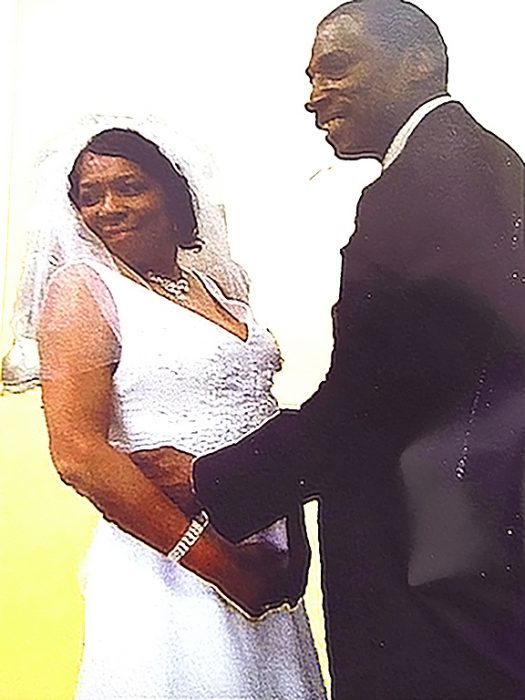
He has been clear of the system for over 15 years. His neat appearance is in part a buffer from the thug-life he once lived. “If I didn’t tell you, you wouldn’t know I have that history.”
Still, he gives all credit for his transformation to a woman he met buying shoes on Market Street in 2009 – and married in 2012. Ritza Russell was from Santa Rosa with three grown daughters and 13 grandkids.
“First, we courted back and forth, three years, very respectful. I’d be jumping on the GG Transit #101 to Santa Rosa. When her kids gave me the green light of approval, we married in the church where she was a secretary. “
It was the first marriage for both. “So, I became a stepfather and a step grandfather, and that was a beautiful thing.”
Stepdaughter Cherita speaks lovingly of Franks. “He is simply a wonderful guy. My kids call him GPC, for Grandpa Charlie.”
He got a job at Creekside Convalescent Hospital in Santa Rosa as a housekeeper, working in the behavioral health unit where people with mental disabilities are housed.
“I wasn’t scared. I learned a lot working there, that’s why I pay attention to people with mental disabilities here on the streets, see their state of mind, I seen what the psychotropic medications do: how it holds you and has you in a state of, you know,” he said, shaking his head.
Beaten by cancer
In Santa Rosa, family life was rich, comfortable: Work. Home. Barbeques.
He taught his grandsons how to throw and play the outfield. He celebrated birthdays. Then Ritza was diagnosed with cancer of the jaw bone. “Cancer did us close to three years, three years we fought it before it took her life on June 26, 2019. “
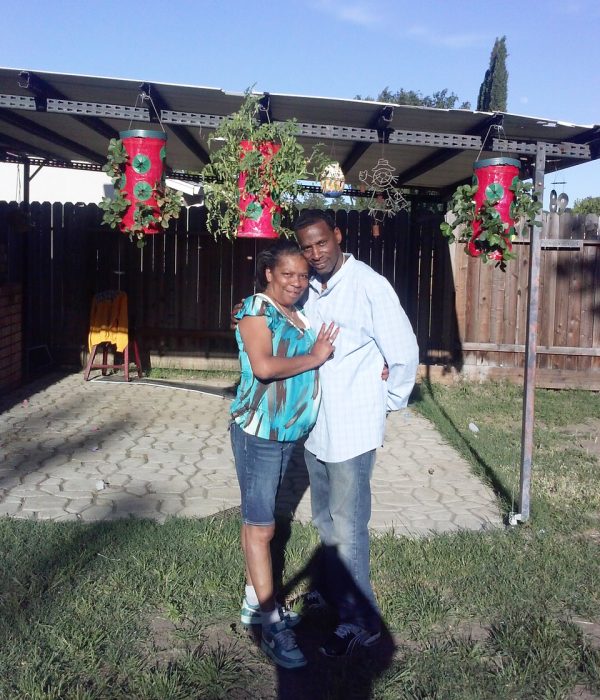
The stable life he had was gone. Three months after her death, lost in grief, he came back to San Francisco. “I didn’t know what to do with myself. I’d quit my job to take her to treatment and care for her. I was in shock, not responsive to nothing, asking ‘God, Why Me.’ ”
He lived on the streets, using crystal methamphetamine “to escape my mind.” He didn’t want to see his step family or friends from the old days. “I was just doing me, getting high every day, laying me where I lay down.”
Almost a year had gone by when in January 2021, he went into a donut shop at Golden Gate and Larkin to escape a downpour. Drenched and shivering, he was “huddled around the one cup of coffee I could buy, spilling it on myself I was so shaky” when a woman looked over at him, “Cricket, that you?”
That woman was Jackie Freeman, one of the supervisors of the Homeless Outreach Team and a neighbor from the ‘hood. She asked if he was on the streets, and did he want to get off.
“Yes I am, I said, and Yes I do.”
‘I respect them all’
She told him to be at the Cathedral at Geary and Gough at 4 p.m., where she would have a confirmation number for a shelter bed for him. He was there at 2.
“That very day, I got a bed. From that bed to the bed I am in today, to my job with the Downtown Streets Team, I thank you to Ms. Jackie Freeman.”
These days he gets up extra early to prepare for work because his team depends on him. “I got to get my mind right to help my team. We come from all the walks of life: addiction, hopelessness, abuse. And I respect them. “
Franks would like to work helping exiting inmates re-integrate into the community. But the training requires a high school diploma, and he is not ready for that yet. Or in human services, “working with people, giving back and giving back what was given to me.“
In the meantime, he’s happy cleaning streets and training street cleaners like himself. Now that Safeway gift cards are behind him and he’ll be making real wages, he’s hoping to find his own place to live. He is on two lottery lists for low-income housing. He still talks to his step-kids and they check in on him, but he has no plans to move back to Santa Rosa, not with his wife gone. “Three years since she died, and I haven’t even dated. I haven’t even wanted to be with anyone.“
He’s happy in the moment and excited about his first paycheck. “I’m gonna get me a motor scooter, a super-duper one, not any bummed-out junk. I am gonna get a scooter as jazzy as me!”



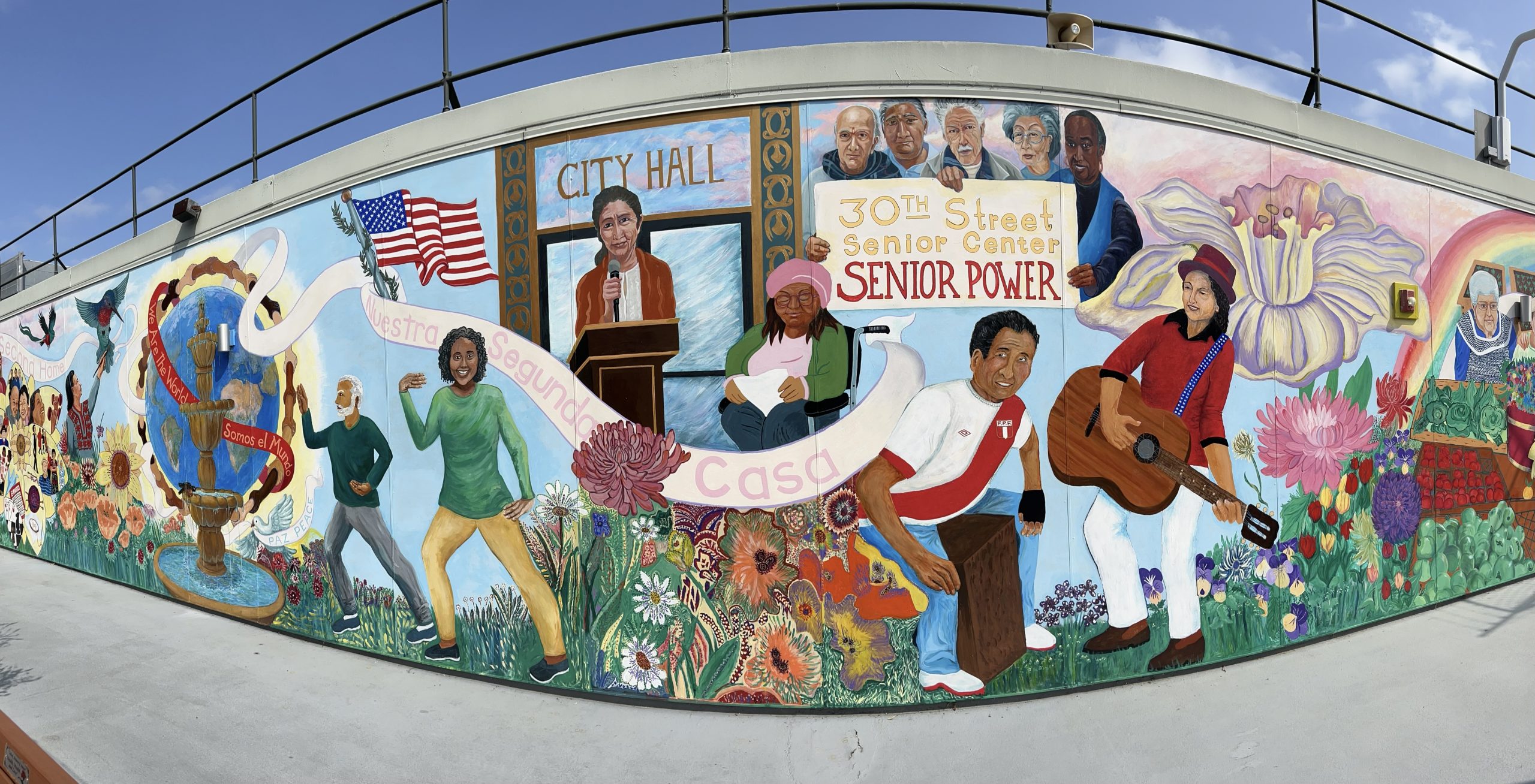
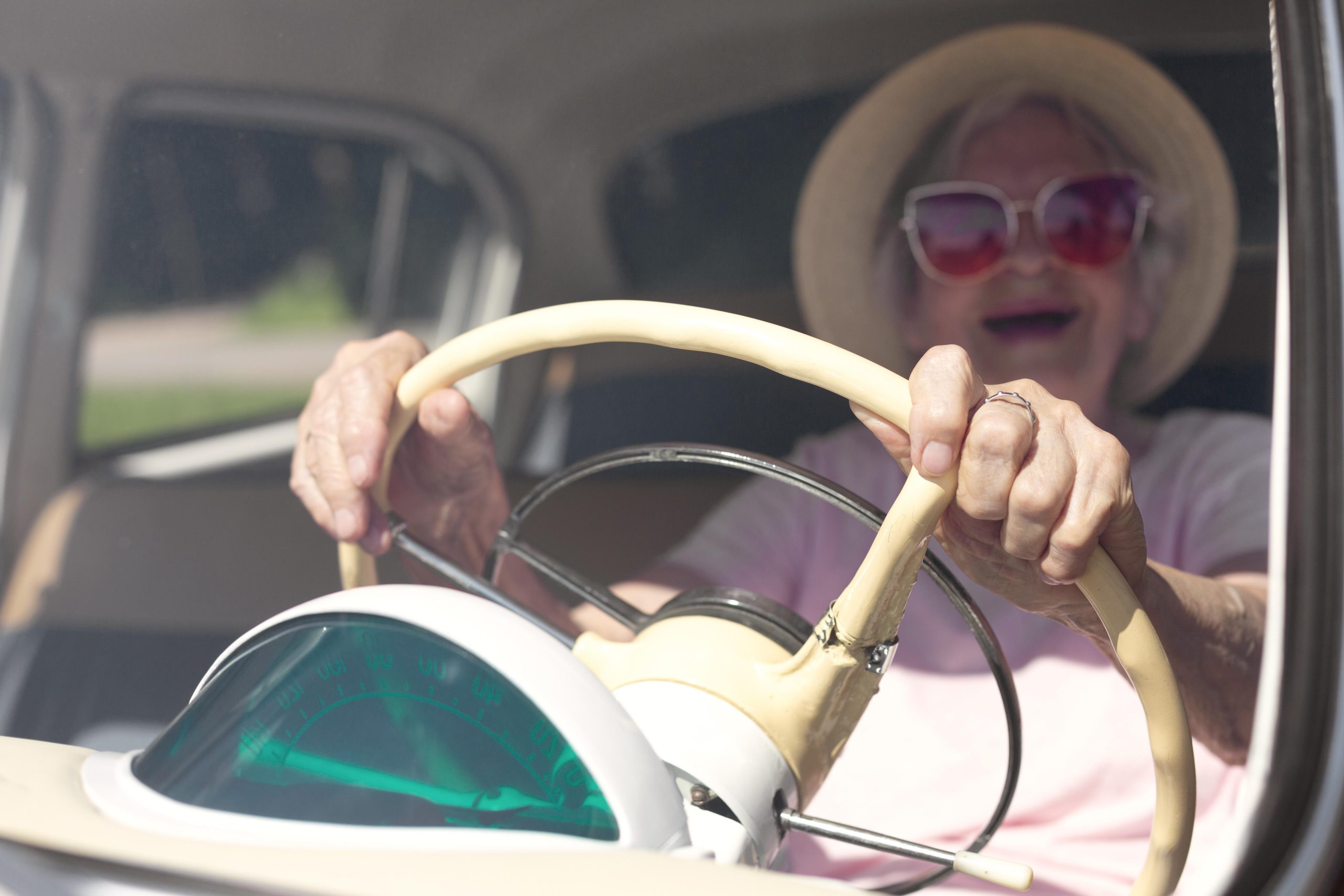
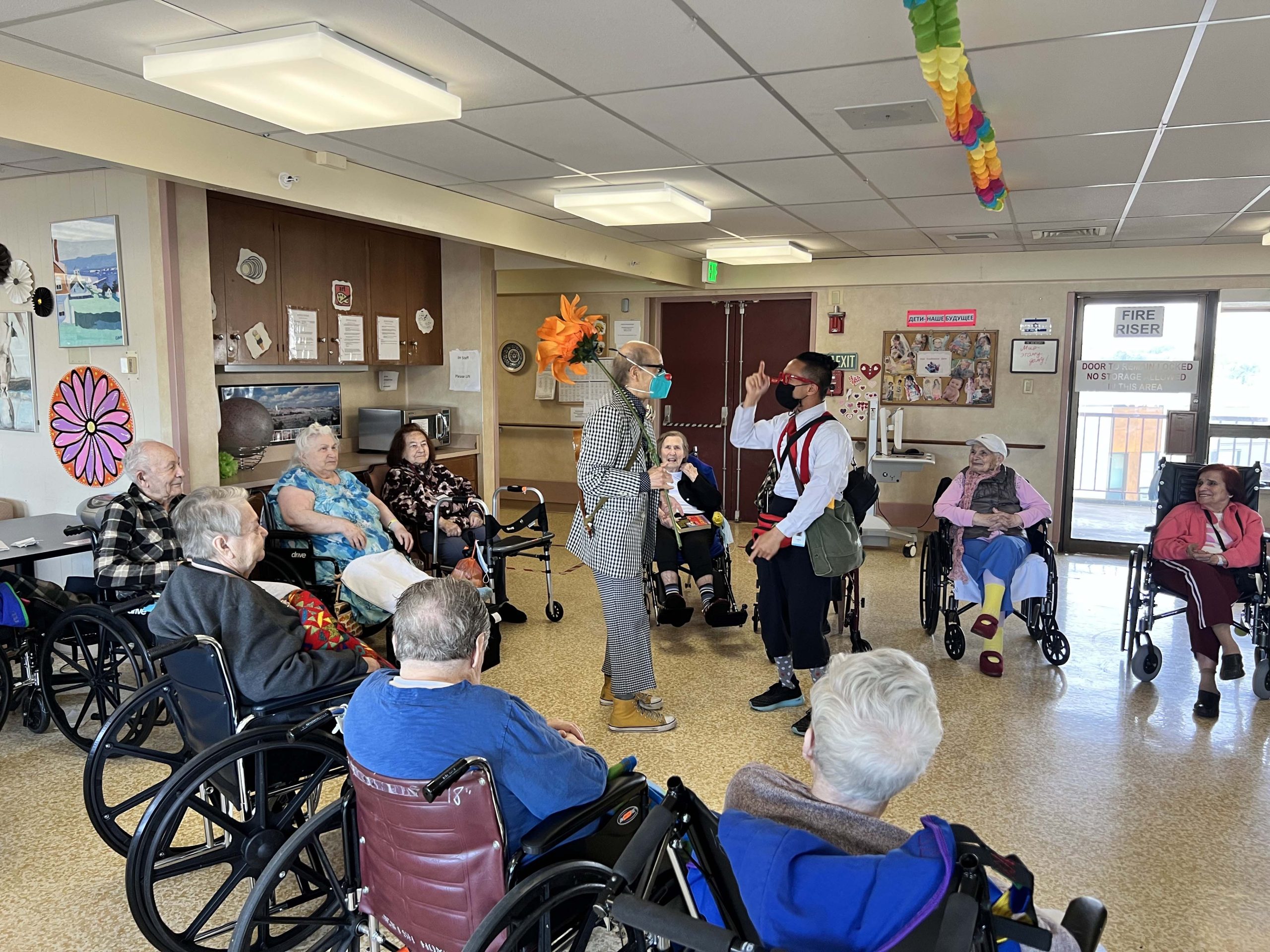
Savannah
Thank you for sharing Charles's story. I am lucky enough to work with him at Downtown Streets Team, and am so proud of how far he has come. Charles has a heart of gold and I loved seeing his personality shine in this story.
Renee Reyes
I truly enjoy reading this story about Mr. Franks and, I 'm so very proud of all his hard work and efforts. My name is Renee Thomas-Reyes the Case Manager Supervisor for St. Vincent DePaul Navigation Center SF/ Site E we service the unhoused population by providing them with a bed a place to shower and 3 hot meals a day. Some of our guest have been here since the pandemic but some have been homeless for over 20 years. There is no reasonable affordable housing in San Francisco, I commute 1 hour each way to work everyday and what motivate me is to have a success stories like Charles Franks who has been through a lot of hardships grief and losses but through our wonderful case management team that offer 1:1 sessions, groups, DMV voucher, bus tokens, and other resources to have more stories like Charles Franks. Charles has a full time time job now but, we are still trying hard to place him into housing. If anyone or agencies can assist me with this my direct line to help Charles Frank and many more here at Division Circle Navigation Center This article of Charles Frank shows their is hope at the end of the Rainbow. Blessings and Thank you Naomi for always writing stories from the heart. Great Work Charles we here at St. Vincent DePaul Society/Site E are extremely proud of you.